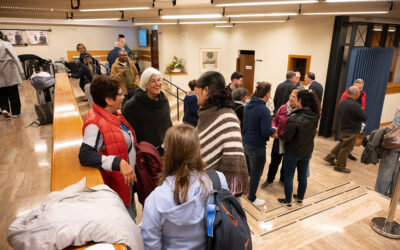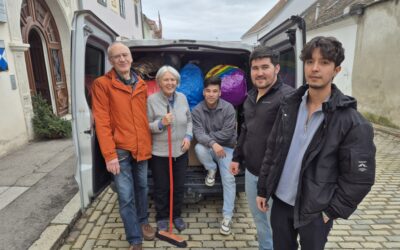 “Prof. Ehrlich is one of the great figures of Jewish-Christian dialogue, not only in Germany but also in Europe and beyond.” This was how Hans Hermann Henrix, director of the Aquisgrana Catholic Academy introduced the awardee. “Profoundly marked by his own painful experience as a Jew during the Nazist regime, he could have had every reason to counterattack rather than courageously tred new roads,” Henrix added. Prof. Ehrlich, he said, is a man of dialogue as are few others, a man “not intent upon erasing differences and divisions but rather open to appreciating the other person.”
“Prof. Ehrlich is one of the great figures of Jewish-Christian dialogue, not only in Germany but also in Europe and beyond.” This was how Hans Hermann Henrix, director of the Aquisgrana Catholic Academy introduced the awardee. “Profoundly marked by his own painful experience as a Jew during the Nazist regime, he could have had every reason to counterattack rather than courageously tred new roads,” Henrix added. Prof. Ehrlich, he said, is a man of dialogue as are few others, a man “not intent upon erasing differences and divisions but rather open to appreciating the other person.”
The Klaus Hemmerle Award was instituted during a ceremony marking the 10th anniversary of his death. The award – which is given to persons who are committed to building unity and dialogue among Churches and religions – was conferred for the first time, following a formal liturgical service celebrated in the Aquisgrana Cathedral by Miloslav Cardinal Vlk of Prague and Bishop Heinrich Mussinghoff of Aquisgrana.  Bishop Mussinghoff, in his opening remarks, extended his congratulations for the excellent choice of the first awardee. He recalled that Ernst Ludwig Ehrlich had contributed to forming the first Jewish-Christian group at the heart of the German Catholics’ Central Committee. It was in this context that a very close friendship between Bishop Hemmerle and the awardee began. Prof. Ehrlich: my friendship with Bishop Hemmerle In his thanksgiving remarks, Prof. Ehrlich recalled his early meetings with Bishop Hemmerle, his close friend and colleague. He said that he was deeply impressed by Bishop Hemmerle’s understanding of Judaism “from within”; more than writing about Christian-Jewish relations, he lived them out with unprecedented depth, dignity and spirit of brotherhood. This is something he had in common with Pope John Paul II, who had successfully created signs of friendship and brotherhood in a number of profound and highly symbolic encounters with representatives of Judaism. Cardinal Vlk: Bishop Klaus Hemmerle’s was a life spent for unity In his homily, Card. Vlk put into light the deep bond that existed between Bishop Klaus Hemmerle and the Focolare Movement. He said that Hemmerle was a man of unity, who succeeded in finding links between the Church and the world, believers and non-believers, intellectuals and laborers. Hemmerle attributed his personal ability to embody unity, to “expand his soul to embrace God and every human being”, to his meeting with Chiara Lubich and the spirituality of the Focolare Movement which deeply affected his life. Chiara Lubich: Be apostles of dialogue and communion Chiara Lubich sent a message for the occasion, in which she remembered Bishop Hemmerle as a co-founder of the spiritual and international community of the Focolare and invited all those present to be “apostles of dialogue and communion …” as Hemmerle was.
Bishop Mussinghoff, in his opening remarks, extended his congratulations for the excellent choice of the first awardee. He recalled that Ernst Ludwig Ehrlich had contributed to forming the first Jewish-Christian group at the heart of the German Catholics’ Central Committee. It was in this context that a very close friendship between Bishop Hemmerle and the awardee began. Prof. Ehrlich: my friendship with Bishop Hemmerle In his thanksgiving remarks, Prof. Ehrlich recalled his early meetings with Bishop Hemmerle, his close friend and colleague. He said that he was deeply impressed by Bishop Hemmerle’s understanding of Judaism “from within”; more than writing about Christian-Jewish relations, he lived them out with unprecedented depth, dignity and spirit of brotherhood. This is something he had in common with Pope John Paul II, who had successfully created signs of friendship and brotherhood in a number of profound and highly symbolic encounters with representatives of Judaism. Cardinal Vlk: Bishop Klaus Hemmerle’s was a life spent for unity In his homily, Card. Vlk put into light the deep bond that existed between Bishop Klaus Hemmerle and the Focolare Movement. He said that Hemmerle was a man of unity, who succeeded in finding links between the Church and the world, believers and non-believers, intellectuals and laborers. Hemmerle attributed his personal ability to embody unity, to “expand his soul to embrace God and every human being”, to his meeting with Chiara Lubich and the spirituality of the Focolare Movement which deeply affected his life. Chiara Lubich: Be apostles of dialogue and communion Chiara Lubich sent a message for the occasion, in which she remembered Bishop Hemmerle as a co-founder of the spiritual and international community of the Focolare and invited all those present to be “apostles of dialogue and communion …” as Hemmerle was.




0 Comments